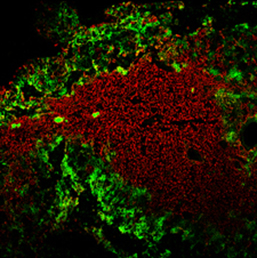 The latest issue of Development includes a paper by Clare Blackburn and colleagues at the Medical Research Council Centre for Regenerative Medicine, University of Edinburgh, showing that the aged mouse thymus can be regenerated in vivo by the upregulation of a single transcription factor, FOXN1. This work has generated quite a lot of interest in the media, so we reproduce below the press release by the Medical Research Council. You can read the research article here.
The latest issue of Development includes a paper by Clare Blackburn and colleagues at the Medical Research Council Centre for Regenerative Medicine, University of Edinburgh, showing that the aged mouse thymus can be regenerated in vivo by the upregulation of a single transcription factor, FOXN1. This work has generated quite a lot of interest in the media, so we reproduce below the press release by the Medical Research Council. You can read the research article here.
Caroline Hendry, PhD
Stem Cells & Regeneration Reviews Editor at Development
Scientists regenerate immune organ in mice
Scientists have for the first time used regenerative medicine to fully restore a degenerated organ in a living animal, a discovery that could pave the way for future human therapies.
The team from the Medical Research Council (MRC) Centre for Regenerative Medicine, at the University of Edinburgh, rebuilt the thymus of very old mice by reactivating a natural mechanism that gets shut down with age.
The regenerated thymus was very similar to one in a young mouse in terms of structure and the genes expressed. The function of the organ was also restored, and mice receiving the treatment began making more T cells – a type of white blood cell important in fighting infection. However, the researchers do not yet know if the immune system of the older mice was strengthened. The research is published today in the journal Development.
Professor Clare Blackburn from the MRC Centre for Regenerative Medicine, at the University of Edinburgh, who led the research, said:
“By targeting a single protein, we have been able to almost completely reverse age-related shrinking of the thymus. Our results suggest that targeting the same pathway in humans may improve thymus function and therefore boost immunity in elderly patients, or those with a suppressed immune system. However, before we test this in humans we need to carry out more work to make sure the process can be tightly controlled.”
The thymus, located in front of the heart, is the first organ to deteriorate as we age. This shrinking is one of the main reasons our immune system becomes less effective and we lose the ability to fight off new infections, such as flu, as we get older.
Researchers targeted a key part of this process – a protein called FOXN1, which helps to control how important genes in the thymus are switched on. They used genetically modified mice to enable them to increase levels of this protein using chemical signals. By doing so they managed to instruct immature cells in the thymus – similar to stem cells – to rebuild the organ in the older mice. The regenerated thymus was more than twice the size than in the untreated mice.
Dr Rob Buckle, Head of Regenerative Medicine at the MRC, said:
“One of the key goals in regenerative medicine is harnessing the body’s own repair mechanisms and manipulating these in a controlled way to treat disease. This interesting study suggests that organ regeneration in a mammal can be directed by manipulation of a single protein, which is likely to have broad implications for other areas of regenerative biology.”
Previous attempts to provoke thymus regeneration have involved using sex hormones, but these have resulted in only temporary recovery of size and function of the organ. In this study, the recovery of the thymus was sustainable, but more work is needed to ensure there are no unintended consequences of increasing FOXN1.
The research was funded by Leukaemia and Lymphoma Research, the Darwin Trust of Edinburgh, the MRC and the European Union.

Bredenkamp, N., Nowell, C., & Blackburn, C. (2014). Regeneration of the aged thymus by a single transcription factor Development, 141 (8), 1627-1637 DOI: 10.1242/dev.103614
 (1 votes)
(1 votes)
 Loading...
Loading...
 The latest issue of Development includes a paper by Clare Blackburn and colleagues at the Medical Research Council Centre for Regenerative Medicine, University of Edinburgh, showing that the aged mouse thymus can be regenerated in vivo by the upregulation of a single transcription factor, FOXN1. This work has generated quite a lot of interest in the media, so we reproduce below the press release by the Medical Research Council. You can read the research article here.
The latest issue of Development includes a paper by Clare Blackburn and colleagues at the Medical Research Council Centre for Regenerative Medicine, University of Edinburgh, showing that the aged mouse thymus can be regenerated in vivo by the upregulation of a single transcription factor, FOXN1. This work has generated quite a lot of interest in the media, so we reproduce below the press release by the Medical Research Council. You can read the research article here.![]()


 (1 votes)
(1 votes)
It is with out any doubts that the research into controlling aging , and with that the diseases of aging is progressing at a rapid rate. How far it progress and what effects it will have on the social and political is the big question.
It is indeed fascinating reading indeed exciting too. It just needs unlimited money to be available, money that now to my understanding does nothing to advance the care of mankind for this particular science